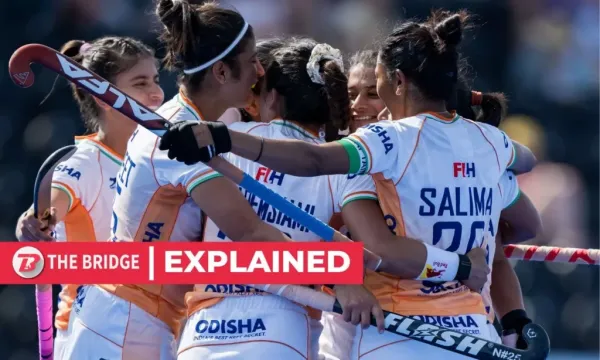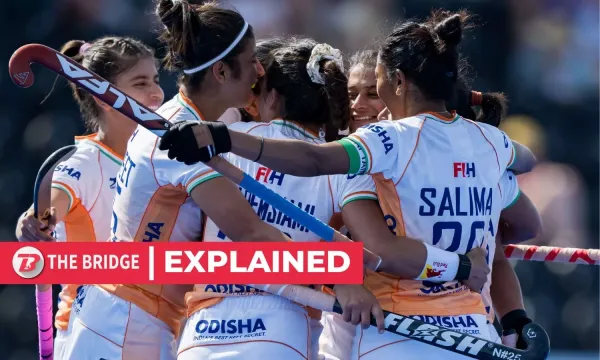

With four matches remaining in their campaign, the Indian women’s hockey team stands at a precarious crossroad in the FIH Women’s Pro League 2024-25.
After 12 games, India sits seventh on the table with 10 points.
Their recent shootout defeat against Argentina, following a 2-2 draw in regulation time, added only a single point to their tally, leaving them just ahead of England (8 points from 12 matches) and Germany (7 points from 10 matches).
The threat of relegation to the second-tier Nations League looms large, and India’s future now hinges not only on their own results but also on those of their closest rivals.
Understanding the points system
According to the Pro League’s format, a team earns three points for a regulation-time win, two bonus points for a shootout win after a draw, one point for a shootout loss, and no points for a defeat in regulation time.
Each team plays a total of 16 matches, and the team at the bottom of the table at the end of the season will be relegated.
As it stands, India can still collect a maximum of 12 points from their final four matches—two against Belgium and two against China. And this would take their total to 22.
However, Germany, which is currently ninth, has six matches in hand and can mathematically reach a high of 25 points.
England, also fighting to survive, has four matches remaining and can reach a maximum of 20.
What India need to do to stay in FIH Pro League?
The equation for India is thus, not straightforward.
Earning anything fewer than 4 points from the remaining fixtures would almost certainly condemn the team to last place.
In such a case, even a single win or a couple of drawn shootout outcomes for England could be enough for them to leapfrog India.
Germany, with the highest number of remaining fixtures, would only need to win three matches in regulation or pick up a combination of results with bonus points to move clear.
If India manages to collect between 4 and 6 points from their last four games, survival becomes possible, but uncertain.
Much would then depend on England’s results against Spain and Germany, and whether Germany falters against Australia, China, or England.
The situation would demand a delicate combination of favorable outcomes across multiple fixtures—something that cannot be controlled or relied upon.
However, if India can notch up 7 or more points from their final four matches, the odds of staying afloat improve drastically.
In that scenario, they would most likely finish with 17 points or more, potentially out of reach for England—who would then need to win all four of their remaining games, including two against Germany—and even Germany would need a nearly flawless run in their last six matches to surpass India.
Given that Germany must still play against England (twice), China (twice), and Australia (twice), their road is far from easy. Australia and China are both competitive sides, and it is unlikely that Germany will sweep all of those matches.
For India, the clearest path to safety lies in beating China twice, if possible. Those games are effectively six-pointers and could both secure crucial points and weaken a nearby rival.
The matches against Belgium, currently placed third, will be tough, but even a draw and a shootout point could make a difference. Every single point from this stage onwards carries enormous weight.
India’s fate is not sealed, but the margins are razor-thin. Relegation is avoidable, but only if India performs decisively and their rivals stumble.
What does relegation mean for India?
Relegation from the FIH Women’s Pro League is not just a drop in status—it carries real, long-term consequences for the national women’s hockey program.
For India, it would mean losing out on 16 high-quality, competitive matches annually, right at a time when the Olympic cycle is gaining momentum.
These fixtures are vital for fine-tuning combinations, blooding youngsters against world-class opposition, and preparing tactically for major tournaments like the Asian Games, World Cup, and the Olympics.
Without Pro League exposure, the international calendar becomes thin, often limited to invitational tournaments and friendlies that lack the same intensity.
This limited match time can lead to rustiness, reduced adaptability under pressure, and an overall drop in international match fitness. Also, sponsorship could be impacted as well.
For a team that needs consistent exposure to stay sharp and evolve tactically, relegation could severely stall momentum and development when it matters the most.
-
Fiction: Will Sonali forget her bitter marriage and start afresh, or will she be happier on her own?

-
Arsenal learn why Viktor Gyokeres transfer is being held up over 'signed letter' saga

-
Centre not publishing Keeladi report is an onslaught on Tamil culture, says MK Stalin

-
MK Stalin Criticizes Union Government Over Keeladi Excavation Report

-
Doctor in Dubai transit recalls son's narrow escape from India plane crash
